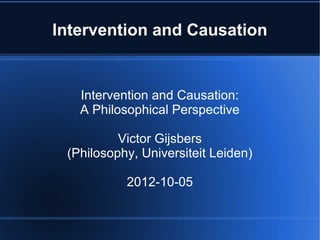
Kick off meeting gijsbers
- 1. Intervention and Causation Intervention and Causation: A Philosophical Perspective Victor Gijsbers (Philosophy, Universiteit Leiden) 2012-10-05
- 2. Causation ● A central topic in modern philosophy. ● Why believe that philosophy could teach us something about causation? ● The idea and use of philosophical analysis.
- 3. Intervention ● Central notion in current debates: intervention. – Pearl, Causality (2000) – Woodward, Making Things Happen (2003) ● Using intervention to understand causation. ● Why is that a good idea?
- 4. Overview ● Causation seems to be: – important, – modal. ● Main development in theories of causation: – From reductive analyses – to interventionist analyses.
- 5. Importance of causation ● Why do scientists care about causation? ● “The law of causality, I believe, like much that passes muster among philosophers, is a relic of a bygone age, surviving, like the monarchy, only because it is erroneously supposed to do no harm.” – (Russell, On the Notion of Cause, 1912)
- 6. Importance of causation ● Science is interested in functional relations. – pV = NkT – number of people infected = F(population density, quality of sanitation, availability of hospitals, …) – P(number of people infected) = F(population density, quality of sanitation, availability of hospitals, …) ● So why be interested in causation?
- 7. Importance of causation ● The functional relations by themselves are not guides to action. ● We want to know about cause and effect. ● But what is the relation between causation and functional relations?
- 8. Causation and modality ● Some of our statements are about what actually happens; others are about modal facts. – What could happen. – What must happen. – What would happen, if... ● Modal statements play an important role in planning, justifying, assigning blame and credit.
- 9. Causation and modality ● Causation seems to be closely linked to modality. ● If A caused B, then, if A had not happened, B would not have happened. ● That doesn't quite work... but intuitively, something in the vicinity should.
- 10. Causation ● Summarising, causation seems to be: – important – modal. ● Suggestive links with action (but at this point, no more than suggestive).
- 11. Reductive theories ● Reductive, regularity theories of causation. – Modal facts have to be reduced to facts about what actually happens. – Actions should not appear in the theory. ● Why? Because our scientific knowledge is based on what we see. Anything else would be superstition, pseudoscience, empty speculation. ● And we only see what is actual.
- 12. Reductive theories ● Science is based on what we see. ● Objection: it is also based on what we do. ● Do → see → science. ● Doing falls out of the equation when we think about the justification of our theories.
- 13. Reductive theories ● We want to analyse causation in terms of observed relations between event types. ● Most simple theory is the constant conjunction theory (Hume, 1748): – A causes B ↔ whenever A happens, B happens immediately afterwards ● Can be changed to accommodate probabilistic relationships.
- 14. Counterexamples ● There is constant conjunction without causation. For instance: – Common cause structures. – “Accidental” conjunction. ● Both are important to recognise in actual scientific research.
- 15. Counterexamples ● Reductive theories fail to capture the modal aspect of causation. ● They fail less often when we add more causal variables. Still – this doesn't look like the right way. There always remains the possibility of accident. ● Which we can accept in practice, but not when we want to know the meaning of causation.
- 16. Interventionism ● Very rough example of an interventionist theory of causation: – A causes B ↔ by intervening on A, we can change B. ● Why would talking about interventions help?
- 17. Using intervention ● We do use interventions to test causal claims. Is A a cause of B? We intervene on A, and check whether B is still probabilistically related to A. – Yes? Causation! – No? No causation! ● Both conclusions can be wrong.
- 18. Interventionism ● Haven't we just added another causal variable? ● Reductive way of thinking: we perform interventions so that we can determine a set of functional relationships that we are interested in. ● The doing is merely there to serve the seeing. ● The possibility of accident remains.
- 19. Interventionism ● Remember our statement of interventionism: – A causes B ↔ by intervening on A, we can change B. ● This is an inherently modal claim. We set A = 1, and what happens is B = 1. But this only counts as a changing of B, if it is that case that had we set A = 0, then B would not have been 1. ● Something counts as a successful intervention only if the effect was not accidental.
- 20. Interventionism ● But why would modality be connected with our doing of things? ● Because when we do things, we make choices. [Insert difficult questions about free will here.] ● It is when we think about our future plans, about what we want to change, and so on, that we start thinking modally; and that we start to get interested in causation.
- 21. Interventionism ● Beings who could only see things, but could not do things, would not be interested in causation. ● What is more: they could not have the concept of causation. We can only understand causation because of the modality of action. ● It is therefore no surprise that a philosophical analysis of causation must use a term like 'intervention'.
- 22. Conclusion ● But it is also no surprise that theories about causal modelling and causal inference can make good use of the notion of intervention. ● Because claims about causation turn out to be claims about the effects of actions. ● Reminder: this is a controversial story!